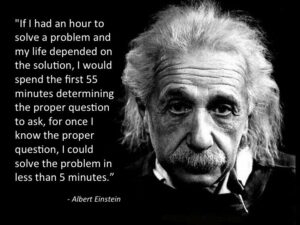
“The Key To Wisdom Is Knowing All The Right Questions” – John A Simon
According to the yoga tradition, the mind is, by definition, activity. The purpose of yoga is not to stop the mind from working but rather to intentionally become aware of and remove ourselves from negative thoughts causing unnecessary suffering. Default and unconscious thinking can keep us from living our most fulfilled lives.
Several of the 60,000 or so thoughts we think each day are in the form of questions. Humans consciously and unconsciously ask questions all day long. Our brains will latch on to whatever stimuli we assign them to focus on. Often, our brains concentrate on the myriad of thoughts floating inside our minds. Questions can direct our focus to help us gain a greater understanding of, and solutions for, our life.
Direct Your Awareness With Questions
Our brains filter out things we do not deem relevant in our surrounding environment. The mind often does this without our awareness. According to Jim Kwik, author of the book “Limitless,” your brain is primarily a deletion device. Meaning, the brain works hard to keep an abundance of information out. You cannot see your nose, which is a very prominent structure right in the middle of your face, because your brain has decided it is irrelevant for you to stare at it all of the time. You would go mad if you had to process the billions of stimuli surrounding you- so your brain filters it out from your visual representation of the world. The brain drains out irrelevant information and only lets in those you deem relevant, care about, or question.
Questions are a powerful cognitive tool that directs our focus toward a specific direction to shift our perceptions and find answers to desired results. The Reticular Activating System (RAS) is a part of your brain that helps determine what to focus on. The RAS gets activated by questions. For example, a few years ago, I was searching for a new car to buy. The car I liked the most was a Toyota Rav4. I began asking myself, “Should I buy a Rav4?” All of a sudden, I started seeing Rav4’s everywhere. Now, there was not a sudden surplus of Rav4’s in my area. These cars were always around. This car model had just blended in with the billions of stimuli that my mind chose not to focus on until I started asking questions about it.
Questions To Enhance Your Life
Mind-science pioneer, Joe Silva, concluded in the 1980’s that affirmations are not a useful tool for creating desired results. Asking questions is much more effective. Affirmations, such as “I am the most patient person in the world,” may not help an impatient person become more patient if they do not believe this statement. You will end up questioning affirmed statements, no matter how kind, loving, or supporting, they are if you do not fully believe them. On the other hand, questions help trick your subconscious into believing the idea or identity you are placing onto it. For example, merely stating, “I am a patient person.” Is not as effective as asking, “How would a patient person respond?”
You can create more of what you want by asking yourself questions to develop changes in various aspects of your life. Vishen Lakhiani, the author of “The Buddha and the Badass,” refers to these questions as “lofty questions.” Lakhiani gives examples of questions you can ask yourself to trick your subconscious into believing what you want to create. Some examples include:
- Why am I in the perfect state of health?
- Why are my days so filled with inspiration?
- Why am I so clear on my goals and visions?
- Why do I have the Universe on my side?
- Why does love always surround me?
- Why do I have such a fantastic team of people working with me?
Questions To Enhance Learning
Questions can also help you learn new information. If you want a better understanding, then ask better questions. Jim Kwik suggests three dominant questions you should ask yourself to optimize your learning potential. These questions can help you take new knowledge and turn it into power.
The three questions are:
1) How can I use this? You can make any learning topic more interesting if you can relate it to how you can use it in your own life.
2) Why must I use this? If you do not have a reason to gain new knowledge, then you are not as likely to remember it.
3) When will I use this? If you do not plan to use the knowledge you learn, then it will go unpracticed. Practice is key when learning any new skill.
These three questions alone “will allow you to get to new levels of learning in your life,” Kwik says.
Questions To Enhance The Quality Of Your Mind
We can also use questions as an awareness tool to discover what it is we are even thinking. A lot of the questions we ask ourselves each day are unconscious. One way to tune into the questions you ask yourself is by listening to your own voice. There are three main questions you can ask yourself to understand and change the inner working of your mind.
1) First, start by asking yourself, “What am I thinking?” You have to look into your brain to understand your thoughts. Do not be surprised or judge yourself if you discover that a majority of your thoughts are negative. Know that it is much easier to think negatively, then it is to think positively. You must bring attention to your thoughts before you can change them. Ask yourself throughout your day, “What am I thinking?”
2) Secondly, ask yourself, “Why am I choosing to think this?” We must take responsibility for our thinking and direct our minds toward intentional thinking rather than default thinking. Our brain likes to be efficient, so it will always go back to default thinking without our awareness. You can question an unwanted thought by asking yourself, “Why am I choosing to think this?” This process will give you your power back and remind you that you can choose your thoughts rather than take them as factual statements.
3) The next question you can ask yourself is, “How does this thought feel?” If this thought makes you feel poorly, then you may want to consider not keeping it. You can also do this process in reverse and notice first what you are feeling. Identify the emotion you are feeling and then ask yourself, “What am I thinking that is causing me to feel__?” This method will open up the opportunity for you to become more aware of your thinking. If you don’t like what you find, pick a different thought.
Another way to enhance your thinking is to look at the results you want in your life. Then generate a question that can lead you toward what you want to create. For example, if the result I want is to have a good day at work, I may ask, “How can I help others have a more enjoyable workday?” throughout my day. This question has the potential to create a much more meaningful workday then if I were to ask, “Why do I have to go to work today?”
Decide What to Question
High-quality questions, or empowering questions, can lead you toward finding constructive and desired answers.
Examples of empowering questions are:
- How can I make this more fun?
- What can I contribute?
- What is the good news?
- What can I do to laugh a lot today?
- How will I make today better than yesterday?
- What am I grateful for?
- How can I nourish myself today?
- How can I make choices that benefit me and everyone around me at the same time?
- How can I live my best life?
- How can I bring more joy to others?
Disempowering, or rather dead end, questions do not lead to desired results.
Examples of disempowering questions are:
- What is wrong with me?
- How am I going to get through this?
- Why did they do that to me?
- What did I do to deserve this?
- What will they think of me?
- Why is it taking so long?
- Why is this happening to me?
- Why do I keep doing this to myself?
- Why can’t I get it together?”
- Any version of “Why can’t she or he do this, that or the other thing?”
What Is Your Dominant Question?
Take a moment and see if you can identify the questions you ask yourself regularly. You can tell a lot about a person just by knowing the question they most dominantly ask themselves. For instance, if someone primarily asks the question, “How do I get people to like me?” That person may experience low self-esteem, spends a lot of time people-pleasing, and may not feel comfortable in their skin.
Once you’ve identified your question, decide if it is empowering. If it isn’t, then change it to something that is. Ask yourself this question as often as you can. Use this question as a replacement for the old, habitual, disempowering one. Your brain will go to work for you and likely come up with a solution.
How to Practice Asking Better Questions:
1) Journaling is a great way to observe the contents of your mind. Practice writing each day every thought that enters your mind. Do this for at least 5-minutes per/day. Once you have identified your thoughts, notice which ones may be causing you to suffer unnecessarily. For example, I often have thoughts about how I am doing things poorly. Such as not working hard enough, putting enough effort into my relationships, staying up on things around the house, spending ample time on projects, etc.
2) Once you notice what you are thinking, ask yourself what you can do to improve thoughts within a general theme. For example: Instead of thinking I am doing everything wrong, what if I adopt the thought, “Maybe I am doing everything, right?” This thought helps me feel empowered and confident in my abilities. The feeling of confidence drives me to continue to take actions that help improve the quality of my life.
3) When I notice a thought come up that I don’t believe to be true, I often think, “Well, isn’t that interesting? Where did that come from”? For instance, if I catch a thought such as, “I am not a good enough writer to be writing things for other people to read,” I can question where this thought came from without judgment. Often this thought comes from my brain attempting to protect me from vulnerability. I can then thank my brain for looking out for me and then choose not to believe this thought to be true. The best part about being a human with a thinking brain is we get to decide what is true and what is not. Whether I am a good writer or not is irrelevant and subjective. BUT I can choose to believe that I am simply because it serves me.
4) When you want to develop more perspective about a decision, you can ask yourself, “How else can I think about this”? For instance, when determining if I wanted to start a blog, I thought it was a silly thing to spend my time doing, it was a pointless endeavor, I’m not any good at writing, people don’t care what I have to say, etc. BUT then I asked myself, “How else can I think about this?” Well, I love writing; I have a lot to write about. I enjoy giving my mind something else to focus on; this blog can be beneficial for me, etc. I could choose either perspective. But I went with the one that was helpful in my life.
5) Come up with at least three thoughts you can ask yourself at the start of each day. These questions will send your brain searching for evidence to support them.
Don’t Question Einstein… Or Should You?

Albert himself knew the power of asking the right questions. Life’s solutions are likely found in your mind. It may take some digging to discover what you choose to question. Remember your brain will go looking to answer whatever you ask it. Be sure to ask yourself the things you want to find. I hope you discover questions that lead you toward the answers you need for your life. Good luck!







